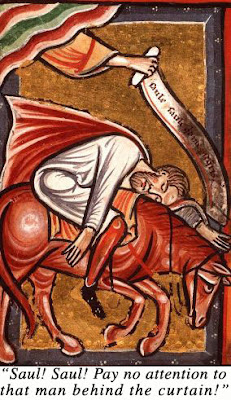Holy Week Hoedown
 Jay Currie has responded in kind (that is to say, in the first of what is to be two parts) to my loosely contra-Pelagian manifesto of last week.
Jay Currie has responded in kind (that is to say, in the first of what is to be two parts) to my loosely contra-Pelagian manifesto of last week.I should say that it turns out that JC is one of the most infuriating people I've ever had an argument with. Not because he's so unrelenting in his beliefs, or because he's an uncommonly sound thinker. He is, of course, both of these, but that isn't enough to completely faze me. Rather, what is making him more and more of an impossible opponent is that he is that very rare type of person that is able to balance strong opinions with genuine courtesy and, even, kindness (indeed, I'm inclined to call it charity). That is, (as our mutual friend, Kevin Grace, put it so well to me last week) he is able to distinguish between a quarrel and an argument ... Which is, I suspect you've noticed too, almost totally unheard of in this day and age, and so hardly what I was prepared for.
As a consequence, I find myself in the very annoying position of having now to juggle my, in some instances, extreme opposition to JC's views with this niggling suspicion that I'd be hard-pressed to find a better person to be godfather to my first born ... But that's the secular humanist in me talking. And while I'm fond of the guy (the secular humanist in me, I mean), his thinking is a little too limited and circular for my tastes. (I'm waiting for JC to recognize the same thing about the secular humanist in him, and to not let him do so much of the talking then.)
Anyway ... I'm honour-bound to leave off replying to JC at any length until the second of his two parts is posted, so I will only, quickly, point out this:
Drawing on his estimable, if very literal, understanding of the Old Testament, JC cannot let go of his conception of Original Sin as a curse. Thus, says he, given the Christian qualification to the Old Testament that God is truly and purely love, this Original Sin business might better be described as the Original Error; as the Original Heresy, even.
Fair enough.
The problem with this is that Original Sin is no more a curse (in the imposed, conniving sense we tend to attribute to that term) than is our having ten fingers rather than twenty, or one head rather than two. Original Sin is, I think, much better understood as a shortcoming; an obstacle to our immediate or instantaneous union with God. Now, you can talk about the injustice of this, of the cruelty of the kind of God who wants us to learn to comprehend him rather than simply serving it up to us straight off--but you definitely can't say that the obstacle doesn't exist. It must, or presumably we'd have all been hanging out in the Celestial Rose from the beginning, high-fiving the uncrucified Christ, and exchanging transcendental platitudes with that charming soul Adolf Hitler.
Platonism goes far in explaining this idea, and hence its (Platonism's) appeal to Christian thought: evil is best understood by Man (who is flawed, yes, but for whom there remains the greatest of Hopes) as the absence of light. Rather, that is, than as darkness in and of itself.
I defer to C.S. Lewis for the final word here:
God has not been trying an experiment on my faith or love in order to find out their quality. He knew it already. It was I who didn't. In this trial He makes us occupy the dock, the witness box, and the bench all at once. He always knew that my temple was a house of cards. His only way of making me realize the fact was to knock it down.__________________________
[...]
Imagine a man in total darkness. He thinks he is in a cellar or dungeon. Then there comes a sound. He thinks it might be a sound from far off--waves or wind-blown trees or cattle half a mile away. And if so, it proves he's not in a cellar, but free, in the open air. Or it may be a much smaller sound close at hand--a chuckle of laughter. And if so, there is a friend just beside him in the dark. Either way, a good, good sound. I'm not mad enough to take such an experience as evidence of anything. It is simply the leaping into imaginative activity of an idea which I would always have theoretically admitted--the idea that I, or any mortal at any time, may be utterly mistaken as to the situation he is really in.
Five senses; an incurably abstract intellect; a haphazardly selective memory; a set of preconceptions and assumptions so numerous that I can never examine more than a minority of them--never become even conscious of them all. How much of total reality can such an apparatus let through?
ADDENDUM
So exhausted was I last week, having finished my assault on JC, that I forgot to post the link to his initial impressions thereof. For the sake of continuity and, I guess, because he makes an admissible point or two (whatever), they should be read ... The business about the "happy clappers going over to Atlanta or Albuquerque or wherever the Holy See of American Protestantism is these days" is, at the very least, worth the price of admission.




<< Home